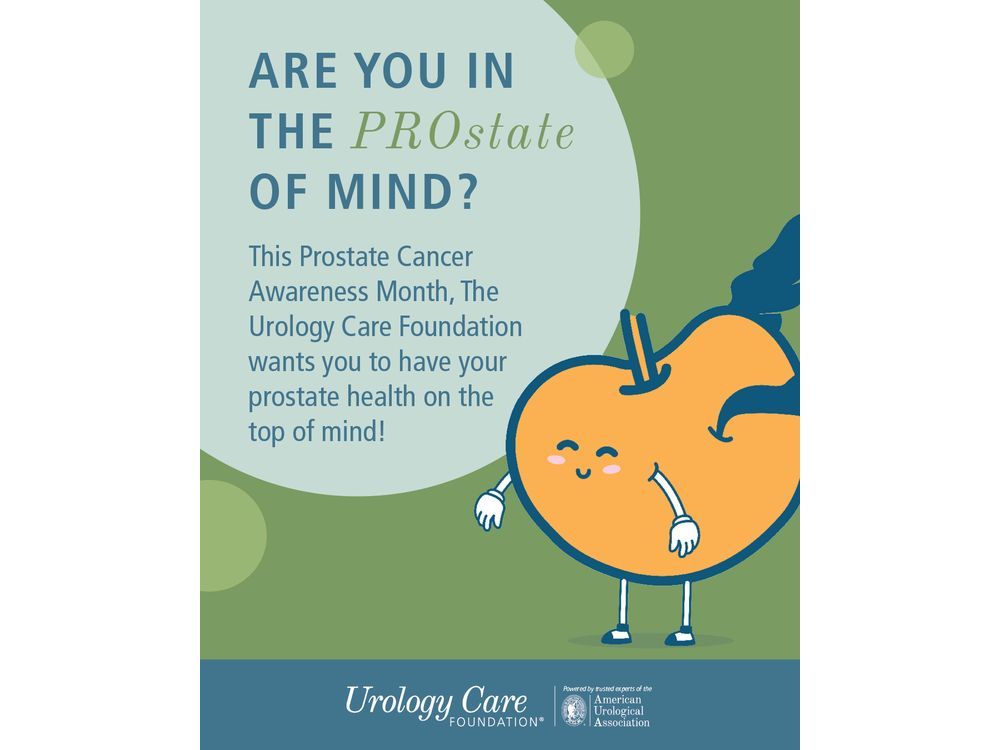Health
Prostate Cancer Awareness Month Urges Men to Take Action

September marks Prostate Cancer Awareness Month, prompting the Urology Care Foundation (UCF), associated with the American Urological Association (AUA), to encourage proactive measures regarding prostate health. The initiative, titled “PROstate of Mind,” emphasizes the importance of early detection and lifestyle adjustments in combating prostate cancer.
According to the American Cancer Society, prostate cancer is the most prevalent cancer among men in the United States, excluding skin cancer. In 2025, approximately 313,780 new cases are projected, with an estimated 35,770 deaths, making it the second leading cause of cancer-related fatalities in men after lung cancer.
Prominent prostate cancer survivor Gabe Canales shared his experience to highlight the significance of early diagnosis. “Men need to encourage other men to get checked,” Canales stated. “In 15 years of advocacy, I have seen how early detection can change the course of a man’s life. We need to normalize honest conversations about prostate cancer and the importance of catching it early.”
Early detection is crucial, as prostate cancer is highly treatable when identified in its initial stages. The five-year relative survival rate stands at an impressive 97.9%. Despite this, diagnoses of advanced-stage prostate cancer have increased by 5% annually since 2014. Dr. Adam Weiner, a urologic oncologist at Cedars Sinai Medical Center in Los Angeles, emphasized the benefits of early detection: “Screening gives men the chance not only for longer life but for healthier years with the people they love.”
Understanding individual risk is vital. Nearly 1 in 8 individuals with prostates will face a prostate cancer diagnosis in their lifetime. The risk rises significantly for certain demographics: 1 in 6 for African American men and 1 in 5 for those with a family history of the disease. Other contributing factors include age, with most cases occurring in individuals over 65, exposure to harmful chemicals, obesity, and specific occupations such as farming, firefighting, and military service.
Prostate cancer may not present symptoms in its early stages. When symptoms do occur, they often resemble those of an enlarged prostate or Benign Prostatic Hyperplasia (BPH). Individuals are encouraged to consult healthcare providers if they experience:
– Dull pain in the lower pelvic area
– Frequent urination
– Difficulty passing urine, accompanied by pain or a weak urine flow
– Blood in the urine (hematuria)
– Painful ejaculation
– Pain in the lower back, hips, or upper thighs
– Loss of appetite or weight
– Bone pain
The American Urological Association recommends that individuals with prostates aged 45 to 69 discuss screening options with their doctors, while those at higher risk should consider starting screening as early as 40.
For comprehensive information on prostate cancer, the Urology Care Foundation offers a wealth of resources, including the Prostate Cancer Info Center and a range of informational materials available on their social media platforms.
As we enter September 2025, the call to action is clear: adopting a proactive mindset regarding prostate health can save lives. By fostering open conversations and encouraging regular screenings, we can work towards reducing the impact of prostate cancer in our communities.
The Urology Care Foundation, established as a leading nonprofit organization in urological health, continues to advocate for improved care through research, education, and community support. For more information on their initiatives, visit www.urologyhealth.org.
-

 Lifestyle1 week ago
Lifestyle1 week agoChampions Crowned in Local Golf and Baseball Tournaments
-

 Science2 weeks ago
Science2 weeks agoMicrosoft Confirms U.S. Law Overrules Canadian Data Sovereignty
-

 Education1 week ago
Education1 week agoRed River College Launches New Programs to Address Industry Needs
-

 Technology2 weeks ago
Technology2 weeks agoDragon Ball: Sparking! Zero Launching on Switch and Switch 2 This November
-

 Technology2 weeks ago
Technology2 weeks agoGoogle Pixel 10 Pro Fold Specs Unveiled Ahead of Launch
-

 Technology2 weeks ago
Technology2 weeks agoWorld of Warcraft Players Buzz Over 19-Quest Bee Challenge
-

 Science2 weeks ago
Science2 weeks agoChina’s Wukong Spacesuit Sets New Standard for AI in Space
-

 Science2 weeks ago
Science2 weeks agoXi Labs Innovates with New AI Operating System Set for 2025 Launch
-

 Science2 weeks ago
Science2 weeks agoTech Innovator Amandipp Singh Transforms Hiring for Disabled
-

 Technology2 weeks ago
Technology2 weeks agoNew IDR01 Smart Ring Offers Advanced Sports Tracking for $169
-

 Health2 weeks ago
Health2 weeks agoRideau LRT Station Closed Following Fatal Cardiac Incident
-

 Technology2 weeks ago
Technology2 weeks agoHumanoid Robots Compete in Hilarious Debut Games in Beijing
-

 Technology2 weeks ago
Technology2 weeks agoFuture Entertainment Launches DDoD with Gameplay Trailer Showcase
-

 Health2 weeks ago
Health2 weeks agoB.C. Review Urges Changes in Rare-Disease Drug Funding System
-

 Technology2 weeks ago
Technology2 weeks agoGlobal Launch of Ragnarok M: Classic Set for September 3, 2025
-

 Science2 weeks ago
Science2 weeks agoNew Precision Approach to Treating Depression Tailors Care to Patients
-

 Technology2 weeks ago
Technology2 weeks agoInnovative 140W GaN Travel Adapter Combines Power and Convenience
-

 Business2 weeks ago
Business2 weeks agoNew Estimates Reveal ChatGPT-5 Energy Use Could Soar
-

 Lifestyle2 weeks ago
Lifestyle2 weeks agoVancouver’s Mini Mini Market Showcases Young Creatives
-

 Health2 weeks ago
Health2 weeks agoGiant Boba and Unique Treats Take Center Stage at Ottawa’s Newest Bubble Tea Shop
-

 Science2 weeks ago
Science2 weeks agoInfrastructure Overhaul Drives AI Integration at JPMorgan Chase
-

 Top Stories2 weeks ago
Top Stories2 weeks agoSurrey Ends Horse Racing at Fraser Downs for Major Redevelopment
-

 Technology2 weeks ago
Technology2 weeks agoDiscover the Relaxing Charm of Tiny Bookshop: A Cozy Gaming Escape
-

 Technology2 weeks ago
Technology2 weeks agoBorderlands 4 Promises Massive Changes with 30 Billion Guns








